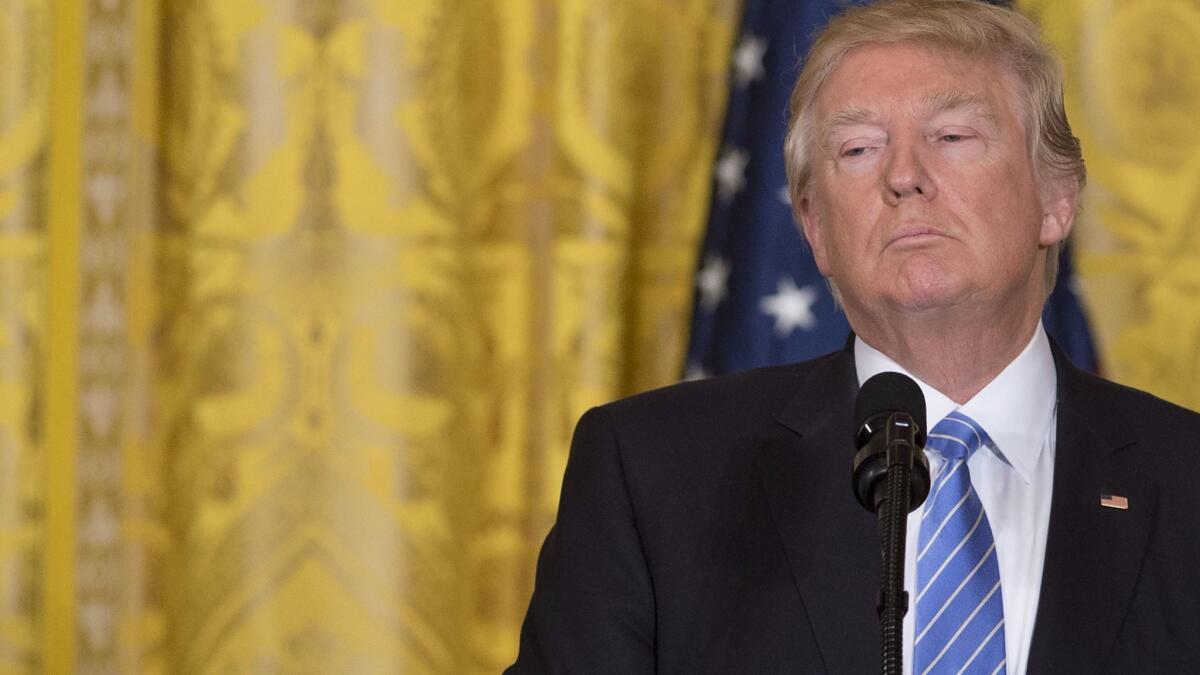Trump is showing a reluctance to take responsibility for White House chaos

- Share via
Reporting from Washington — Asked for the first time publicly to address the dismissal of Michael Flynn, his national security advisor, President Trump was clear Wednesday in his frustration.
But the president’s target was not Flynn, a retired Army lieutenant general, nor his conduct.
“Gen. Flynn is a wonderful man,” Trump said. “I think he’s been treated very, very unfairly by the media — as I call it, the fake media — in many cases.”
Trump’s answer — in which he also blamed intelligence officials for “illegally” leaking information that prompted Flynn’s ouster — marked the most prominent example to date of his reluctance to publicly shoulder the responsibility for missteps at the White House.
Nearly a month into his first term, Trump’s instinct seems to be to instead return to the role he’s shown he is more comfortable in: fighting back against treatment he views as unfair to him or to those close to him. And rather than putting controversy to rest, his approach has generated even more turmoil.
After Trump pointed his finger at the media and the intelligence and law enforcement communities, Press Secretary Sean Spicer endured a barrage of questions from reporters not just on Flynn’s dismissal, but also about a New York Times report that Trump campaign officials were in direct contact with Russian intelligence officials, long denied by Trump aides.
Spicer echoed Trump’s stated concern over leaks to reporters, which the president called “a criminal act.”
“The idea that there’s been zero attention paid to an issue of that sensitivity should be concerning and alarming,” Spicer said.
Trump also skirted accountability at the news conference, and at two others in the last week, by choosing to take questions mostly from reporters at conservative-leaning outlets who tended to skip queries about the most glaring problems facing him.
The White House’s focus on attacking the media did little to quell questions about whether Trump fired Flynn only once it became clear that evidence would be made public that Trump had known for weeks that Flynn had misrepresented himself to other top administration officials, including Vice President Mike Pence, about his discussions in December with the Russian ambassador over U.S. sanctions.
The administration’s strategy further confounded even fellow Republicans, who are eager to press ahead with an ambitious policy agenda that includes tax reform, repealing the Affordable Care Act and a regulatory overhaul.
Senate Majority Leader Mitch McConnell (R-Ky.) offered rare public criticism of the president, telling the Weekly Standard that Trump’s approval ratings would be “10 to 15 points higher if he allowed himself to stay on message.”
Any president, by the nature of the office, is the “most criticized person in the world,” McConnell said, advising Trump not to respond to all criticism to avoid generating a “multi-day story.”
“What he’s saying makes everything harder,” the majority leader said.
Trump memorably proved during the campaign that few criticisms were too small for him to dwell on, feuding with a sitting judge, a Gold Star family and even Pope Francis.
As Trump avoided answering personally for the Flynn case, calls grew for a more expansive congressional inquiry. The top Democrats on six key committees wrote to the White House counsel seeking further information on its internal probe of Flynn.
The Democrats noted that Trump had personally “remained silent in the face of increasingly vocal calls for more information,” and questioned whether the president would have dismissed Flynn had additional information not been made public through the media.
“He was OK with Flynn being dishonest. He was OK with the vice president misrepresenting the truth to the country.... I suppose what bothers him is being forced to act,” Rep. Adam B. Schiff (D-Burbank), the top Democrat on the Intelligence Committee, told MSNBC.
Asked whether he could point to a president whose tenure started with similar unrest, longtime Republican strategist Ed Rollins went back more than a century.
“You may have to go back to our 16th president, who had nine states leave the union,” he said of Abraham Lincoln.
Trump’s attempts to shield himself from the deepening controversy were all the more striking because he flouted White House attempts to portray him as in command of the situation.
Spicer maintained Wednesday that the president was “decisive” in dismissing Flynn for misrepresenting his conversations with the Russian diplomat.
“It’s in part why the president was elected,” Spicer said.
Later Wednesday, after Spicer said Trump would address Andrew Puzder’s withdrawal from consideration as Trump’s nominee for Labor secretary, Spicer had to backtrack when an aide told him Trump would not be issuing a statement.
Rollins attributed some of the administration’s troubles to a problem that has dogged many presidencies early on, but that seems especially pronounced in Trump’s case.
“Historically, when a campaign ends on election day, you shift to a policy side. This president chose not to do that,” he said. “Obviously you’re going to be more effective as a team over time. This is the fourth week of a term that lasts 212 weeks. So there’s plenty of time.”
In the face of plummeting approval ratings — Trump took office at a historically low 45%, according to Gallup, and has sunk to 40% — the president is further embracing his campaign mode.
He will attend a rally Saturday in Melbourne, Fla., that the White House said was being organized by his campaign. An apparent reelection campaign is unheard of at this early stage of a president’s first term.
Twitter: @mikememoli
ALSO:
Andy Puzder withdraws as Labor secretary nominee amid Republican opposition
White House backs away from two-state solution in Israeli-Palestinian conflict
More to Read
Get the L.A. Times Politics newsletter
Deeply reported insights into legislation, politics and policy from Sacramento, Washington and beyond. In your inbox three times per week.
You may occasionally receive promotional content from the Los Angeles Times.











